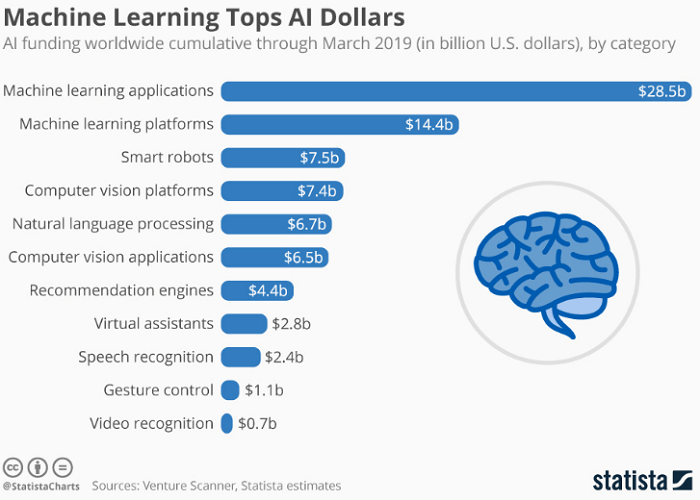More than often ML/AI outsourcing is strictly tied to cost savings. However, it does more than cut down expenses. It can spawn innovative AI products to disrupt your industry and give you access to new skill sets.
Machine Learning has proven to be an exciting offshoot of Artificial Intelligence. It has helped individuals and businesses alike make sense of data in a big way. For instance, a machine learning developer working on a computer program can customize it to facilitate data access, perform automatic tasks, and predict patterns.
Through this entire process, the program is able to continuously learn patterns and consequently improve performance. A good example is Amazon Alexa. Once you command the device to play a particular music file via the Amazon Echo, it will crawl through your playlist, curate your favorite songs, and ultimately create a customized playlist. And all this is made possible by Machine Learning together with Artificial Intelligence.
In this article, we are going to look at ML in-depth and how it can help your business in AI outsourcing.
But before we allow you to start drinking straight from the hosepipe, let’s take a brief background of ML and AI.
Definition of Machine Learning
Basically, ML is the science of teaching computers to learn and behave like humans. The computer’s learning experience is made possible by autonomously feeding them observation and real-world interaction data.
Through data observation, computers are able to look for recurring data patterns and consequently make better future decisions. And although machine learning isn’t necessarily new, it has rapidly grown to become one of the most widely used technologies. Key among the factors driving this growth are powerful and low-cost computational processing, perpetual growth of huge data volumes, and affordable data storage.

According to a 2019 report by Statista, the global Machine Learning industry spending hit an all-time high of $28.5B. The same report indicated that the AI market will rake in approximately $190 billion, making it one of the highest earners within the tech ecosystem.
In terms of profitability, a different report by Accenture forecasts that the AI industry will see a 38% increase in profitability by 2035, a period during which it will generate $14 trillion.
Types of Machine Learning Methods
Supervised machine learning: Entails algorithms applying what they have learned in the past to predict future events. SML starts by analyzing pre-conceived training datasets, followed by producing inferred function through earning algorithm, and finally making output values predictions.
Unsupervised machine learning: This entails training a system using information that is neither labeled nor classified. With unsupervised machine learning, the system explores the data and draw inferences from the datasets instead of figuring out the correct output.
Semi-supervised machine learning: This deep learning method falls in between supervised and unsupervised learning. It uses both partially labeled and completely unlabeled data for training. Mainly, a system that uses this learning method is able to relatively improve the learning accuracy.
Reinforcement machine learning: This learning method works by interacting with its environment to discovers errors, rewards, and produce actions.
Benefits of Outsourcing Machine Learning and AI
Building a fully-functional ML system requires a deeper understanding and evaluation of all the variables that affect the learning process. Additionally, the complexity of Machine Learning development may stretch in-house resources, which makes hiring a machine learning engineer to provide contextual knowledge and advice important.
Below are the benefits of outsourcing ML/AI services:
Help to Efficiently Develop Machine’s Neural Networks
As ana entrepreneur, you can use neural networks to profile information, make sound decisions, and enable your system to make future predictions. And to create a system that drives the neural networks, you need function approximations. Given that these approximations are general, you can deploy them in multiple ML systems to execute different tasks.
With an outsourced team of developers, you get to significantly reduce the neural network development process as well as save in terms of the machine learning developer salary paid. Moreover, an outsourced team often bring along their own equipment, meaning you don’t have to invest in infrastructure and other supplementary on-site materials.
Help Improve Customer Efficiency
Both machine learning and artificial intelligence nests under the biggest data science doll with the sole purpose of extracting data insights. No matter the industry you are operating in, you can utilize data science to analyze huge volumes of data to gain an upper hand over your competitors. For instance, if you are in the retail businesses you can use it to analyze buyer habits for purposes of tailoring your marketing message, create targeted recommendations, and make informed business decisions.
Helps Prune the Decision Making Trees
Another benefit of outsourcing your ML/AI tasks is that it helps streamline your decision-making process. Through their dedication, an outsourced team is able to sort and categorize data inside the Classification and Regression Trees (CART). Additionally, an outsourced team is able to conduct error pruning and measure machine accuracy afterward. Once completed, your system’s reliability is augmented as it is left to focus on the relevant details for more accurate choices.
Now that we have seen the benefits of outsourcing ML/AI developers, what are the things to look out for?
Factors to Consider When Choosing ML/AI Developer
There are multiple factors to consider when it comes to choosing the right solution provider who meets your business needs. They include:
Budget
The first thing to keep in mind when outsourcing for your ML/AI project is to ensure that the service provider is within your budget. With the average machine learning salary going as high as 160K, it is important to be upfront with the developer/ development team about it to avoid misunderstandings. The last thing you want is to be left with an incomplete project due to budget constraints.
Relevant ML/AI Programming Experience
As an enterprise, it is important to consider the programming experience of the developer/development firm you hire. In particular, they should possess industry-specific experience in relation to the industry you are in to avoid misunderstandings mid-way the project.
To validate the outsourcing vendor’s experience, you need to conduct due diligence before by studying their portfolio, examining their past AI project, and even contacting their previous clients.
Expertise in Machine Learning/AI Technologies
Depending on the project’s requirements, AI programmers use a wide range of development tools, technologies, and practices. As such, it important to ensure they have hands-on experience with all the relevant tools and technologies. For instance, if you are looking to develop an image recognition system, ensure that they have computer vision experience.
When examining the potential solution providers, you need to need to establish their expertise in various frameworks and programming languages, such as TensorFlow, Python, R, Torch, Caffe, etc.
Scalability Requirements
When building an AI solution, it is important to choose a firm that is adequately resourced to take on and deliver your project. This is particularly important as it ensures that they have the potential to accommodate the growth of your enterprise in the future when looking to expand the system’s capacity.
And since AI and UX go hand in hand, they should also be able to create generic machine learning algorithms that can be re-used in different apps with minimal or zero modifications.
Final Thoughts
The explosive growth of machine learning has aroused the curiosity of enterprises, with many leveraging on the technology to solve business-related problems. This has resulted in the spiking demand for AI/ML specialists, which is further made worse by tech institutions struggling to bridge the skills gap. The perennial skills shortage not only makes sourcing Artificial Intelligence and Machine Learning programmers hard but also expensive. Worse still, good programmers expect high salaries and recruiting them takes significant effort.
With outsourcing, businesses are able to significantly lower their overhead costs and streamline processes while still handling core functions.

